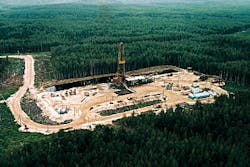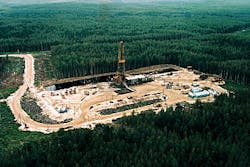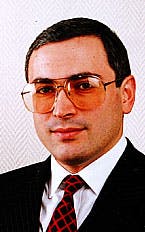Russian oil major Yukos implements western-style reorganization
Dean E. Gaddy
Drilling Editor
Located near the Ob River, the Priobskoye oil field, with estimated reserves of 680 million metric tons, is one of the largest partially developed oil fields in Western Siberia. This field was recently included on the Russian Federation's list of oil fields that can be developed through production-sharing agreements. Photo courtesy of Yukos Oil Co.Russia's Yukos Oil Co., determined to become a world-class oil company, is engaged in an aggressive, two-part reorganization to reduce costs and improve operating efficiencies.
"We have structured the company into several business units," said Mikhail Khodorkovsky, chairman and CEO of Yukos, "each of which has its own revenue targets."
During Phase I, which began July 1998, Yukos realigned the company into three main entities based on upstream, downstream, and corporate business activities. This new organization replaced the former business structure where operations and assets were managed geographically.
Yukos has also outsourced its non-core functions by forming numerous limited partnerships.
These changes have already resulted in sizable improvements in Yukos's financial performance, reducing production costs by 20% and capital spending by 70%.
In Phase II of its restructuring program, initiated in December 1998, Yukos management began to focus on inter and intracompany relationships.
In an interview with Oil & Gas Journal, Khodorkovsky said he views the current oil commodity crisis as an opportunity. "It has forced us to work better and find new means to cut costs."
Khodorkovsky joined Yukos's board and became a leading shareholder when the company was privatized in 1996. In 1997, he was appointed chairman.
His professional growth occurred during a period of transformation as Russia moved towards a market economy. Former positions held by Khodorkovsky include chairman of Menatep, the bank he founded in 1988, and CEO of Rosprom, an investment company.
Yukos yesterday
Yukos is a vertically integrated company that produces, refines, and markets petroleum-based products in Russia and abroad ( Fig. 1 [91,528 bytes]). The company and its subsidiaries-Yuganskneftegas, Samaraneftegas, and Eastern Oil Co.-own 214 oil fields, of which 151 are under development. Of these, 43 are owned by Eastern Oil Co. (Tomsk), a recent acquisition that comprises 18% of Yukos's consolidated reserves.In 1998, the company's aggregate revenues were about $4 billion, making it one of Russia's largest industrial enterprises. For the first quarter of 1999, Yukos estimates its revenues at $900 million.
According to a 1998 audit by Miller & Lents, the company has a reserve base of 12.27 billion boe, making it the fourth-largest non-state-owned oil company in the world, in terms of proven oil and gas reserves (Fig. 2 [103,791 bytes]). Last year, Yukos produced 326.5 million boe, down 4% from 1997, making it Russia's second-largest producer.
Yukos is also Russia's refining leader, processing over 183 million bbl of oil in 1998 and 45.11 million bbl in the first quarter of 1999. The company has the capacity to refine 247 million bbl/year (about 677,000 b/d).
Product sales
Khodorkovsky says the company intends to pay more attention to the retail trade of oil products. Yukos has a products market share of over 70% in nine highly populated regions of Russia, including three regions in Siberia. About two-thirds of Yukos's oil and oil-based products are sold in Russia.In 1998, the company exported 123.76 million bbl of crude oil, 92% of which was sold outside the Former Soviet Union. Yukos accounted for 12.5% of total Russian crude oil exports in 1998.
In the first 3 months of 1999, Yukos's enterprises produced 79.6 million bbl of crude oil, of which 28.7 million bbl was exported. In early 1999, the average price for Yukos crude on the Russian market was $3.80/bbl vs. an average export price of $9.50/bbl.
According to the Dec. 31, 1997, financial results, which constitute the latest available GAAP (generally accepted accounting principles) financial data, Yukos's total liabilities were 31.1 billion rubles ($5.2 billion), 29% of which were long-term liabilities. Shareholders' equity was 24.1 billion rubles ($4.04 billion). As of July 1, 1998, the company had a market capitalization of $2.6 billion.
Yukos tomorrow
Under Phase I of the company's two-part strategy, upstream and downstream operations were realigned into two new entities: Yukos Exploration & Production and Yukos Refining & Marketing ( Fig. 3 [65,360 bytes]). In addition, a third management entity, Yukos-Moskva, became responsible for strategic planning and finances."At one point, we took a close look at BP's business model (for reference)," Khodorkovsky said.
Additionally, Yukos spun off non-core support services into 82 limited partnerships. Over 44,000 employees were transferred to these enterprises, reducing Yukos's payroll costs and eliminating operational redundancies. "This was a necessary step towards building a competitive enterprise," Khodorkovsky said.
The reduction in production personnel to 42% of its pre-reorganization level resulted in an immediate effect on the bottom line. In the first 4 months of the reorganization, Yukos says it was able to reduce its average cost of production per barrel of crude oil by 20%. In January 1998, production costs were $9.30/bbl and have been falling ever since.
Furthermore, since early 1998, Khodorkovsky says the company reduced capital expenditures by 70%. In 1996, capital expenditures totaled $730 million. By the end of 1997, however, they had fallen to $620 million.
Yukos E&P, headed by Yuri Beilin, oversees the company's reserve base in Western Siberia and manages all upstream business, including production sites in Nefteyugansk, Tomsk, and Samara (Fig. 1).
Yukos E&P also manages the company's interests in the newly created service companies involved in oil field services, construction, maintenance, and transportation.
According to an article in Eastern Bloc Energy magazine, Beilin said the company plans to produce 44 million metric tons of oil in 1999. He further stated that Tomskneft (Eastern Oil) will supply 10.5 million tons, Samaraneftegaz 8.0 million tons, and Yuganskneftegaz 25.5 million tons. These subsidiaries produced, respectively, 10.7 million tons, 8.2 million, and 25.9 million tons in 1998.
In addition, Beilin says the company plans to cut its work force further by 10% in 1999.
Yukos R&M, headed by Nikolai Bychkov, supervises Yukos's refineries at Novokuibyshevsk, Samara, Syzran, and Achinsk, as well as 11 wholesale oil marketing companies and an extensive network of gas stations across European Russia.
Internal competition
In Phase II of Yukos's reorganization plan, management began seeking ways to enhance operational efficiencies by outsourcing oil field services to the newly created limited partnerships and by divesting non-core assets.More importantly, the relationship between Yukos's exploration and production activities, on one hand, and refining and marketing operations, on the other, has changed. Yukos's production entities can now sell crude oil to non-Yukos-owned refineries. In addition, Yukos refineries can now purchase non-Yukos crude oil, while Yukos marketing units can sell non-Yukos oil and products.
These changes introduced competition across the spectrum of the company's local business units. Thus, during Phase II, local business units became accountable for their own performance and now define production, cost, and revenue goals to corporate management.
Competitive bidding
Upon completion of Phase II by the end of 1999, Yukos will no longer directly service production sites, transport products, or maintain equipment. Instead, the company will negotiate with independent entities for these services.The company's business units will be able to select vendors through competitive tender offers. "We are the first major Russian oil company to institute such sweeping market-driven changes in our business operations. We are becoming more market-oriented to increase operational efficiency and costs savings," Khodorkovsky said.
Throughout this phase, management expects to reduce average production cost per barrel by an additional 25%.
A top priority
Recently, the Interparty Commission of the Russian Federation's lower house of parliament, the Duma, voted to include the giant Priobskoye oil field on its list of fields to be developed through production-sharing agreements. Khodorkovsky recommended adding this field to the list, stating that, under Russia's current taxation system, development would be unprofitable.Priobskoye field, which was discovered in 1982, is now one of the largest partially developed oil fields in Western Siberia, covering an area of 5,446 sq km (see photo). The license to develop the field's northern part, an area of about 3,000 sq km, belongs to Yuganskneftegas.
Oil reserves are estimated at 680 million tons (5.0 billion bbl). In 1997 and 1998, output amounted to 1.062 and 1.195 million tons of crude oil, respectively.
In all, about 5 million tons have been produced since Priobskoye production began. During 1997-98, more than 520 wells have been drilled, with Yukos investing more than $220 million in the field.
"Yukos regards the Priobskoye oil field as its most important strategic project," Khodorkovsky said in a recent press release. However, costly and environmentally sound technologies must be used to ensure that no damage is done to the ecosystem, much of which is located in the Ob River flood plain. Work is under way to install a waste recycling system incorporating hydraulic seal-cluster drilling and a newly developed system for collecting industrial leakage and rainfall run off.
BU-3000 EUK drilling rigs (3,000-hp), built by the Yekaterinburg-based Uralmash Joint Stock Co., and to be modernized by the Yukanskneftegaz Open Joint-Stock Co., will include specialized tanks, complete with solids-control equipment, supplied by Oil Tools Europe and Derrick USA. These tanks will eliminate the use of reserve and oil-storage pits found on most drilling locations.
This "pitless" technology will physically and chemically separate waste by-products into solid and water phases, the latter to be recycled. The drill cuttings and other solid wastes will be transported by specially equipped trucks to temporary storage sites.
All wastes, including oil-contaminated soil, will be gathered and stockpiled at the location where the treating equipment will be installed. The wastes will then be environmentally treated and put to various industrial and commercial uses.
It was initially believed that Amoco Corp. would act as an equal coinvestor in the project. Following the merger of Amoco and British Petroleum Co. plc, however, BP Amoco plc in March officially renounced plans to share in the project. As a result, Yukos has come to face the choice of either developing the field on its own or looking for another partner.
Yukos's development plans for this field call for $1.59 billion in capital investments over the next 5 years, including $646 million in borrowed funds. Since it is unlikely that an investor will be found within the next 2 or 3 years, the company is carrying on negotiations, started by Amoco, for a World Bank loan. Yukos hopes to conclude talks by the end of 2000.
The company intends to increase the number of employees at the Priobskoye field from 800 in 1998 to 9,500 in 2000.
Technical alliance
In December 1998, Yukos entered into a straight-service alliance with Schlumberger Ltd., earmarking Western Siberia's Prirazlomnoye oil field as one of the first target fields."We are working with Yukos, in an integrated team environment, to apply the correct technical solution by balancing western technology with Russian experience," said Gary Yamamoto, a Schlumberger investor relations official and former manager of Schlumberger's project alliance with Yukos.
Working under a joint steering-committee structure, Schlumberger and Pravdinsneft NGDU, a Yukos operating unit located in Nefteyugansk, performed a number of workover operations on select wells in Prirazlomnoye field. To date, production from these wells has increased by 75%.
"Without the direct benefit of our Yukos-alliance engineers and geologists, none of these results would have been possible," Yamamoto noted. In 1998, Yukos invested 20% of its revenues in new technologies and equipment.
Modernization
In early 1999, Yukos completed the first stage of a large-scale system modernization program at its Yuganskneftegas subsidiary. In 1997-98, the project cost amounted to $65.1 million. The main task for this stage consisted of upgrading 380 km of pipeline for four oil and gas-producing fields operated by the Yuganskneft, Mamontovneft, Maiskneft, and Pravdinskneft producing associations.Equipment was changed out, and old pipe sections were replaced with new. In addition, corrosion-resistant coatings were applied.
By preventing losses along the pipelines, Yukos estimates these upgrades will result in 750,000 tons of additional oil output. In 1998, Yugansk- neftegas's production amounted to 25.8 million metric tons.
Yukos also completed a number of projects at its Kuibyshevsky oil refinery, including the installation of a waste sulfuric-acid regeneration (WSAR) complex, the modernization of its catalytic reforming unit, and an upgrade of two catalytic cracking units. These projects cost the company $11.1 million.
According to Yukos, the launching of the WSAR project led to an increase in average gasoline octane to 85 from 77. Furthermore, Yukos says implementation of the project will result in a 3.5-fold increase in production of Russia's AI-95 grade of gasoline and a 25-fold increase in output of AI-92 grade.
Also in 1998, the company invested $79.5 million in the development of oil fields operated by Yuganskneftegas. Yukos expects this program will result in an average increase of 1.2-1.5 million tons/year of oil production.
Looking to China
Although Khodorkovsky is interested in attracting foreign investors, he feels the realities of today's harsh markets have limited this option. "Right now, we are focusing on what can be realistically achieved," Khodorkovsky said. With the west looking the other way, Yukos is also looking elsewhere.Under an agreement signed on Feb. 25, Yukos will supply an additional 500,000 tons of oil to China by the end of this year. Thus, Yukos will provide a total of 1 million tons of oil to China during 1999.
Furthermore, Yukos and Transneft, on the Russian side, and China National Petroleum Corp., on the Chinese side, have signed an agreement to conduct a feasibility study for laying a 2,300-km pipeline from Angarsk to China. The pipeline will export 25-30 million metric tons/year of Russian oil, with one-third of this oil flowing to other countries of the Asia-Pacific region via Chinese ports.
According to a report in the Moscow Times, the pipeline is estimated to cost $3 billion.
A concern and a remedy
Despite Yukos's increased outward focus, Khodorkovsky is concerned about future prospects with western companies."I feel that a lot of oil companies seem to have lost that adventurous spirit that oil companies used to have. They now act more like bankers than oil men," he said.
There are still companies, however, that are willing to take risks. "I like the view that Enron has towards Russia. They have not lost their hunger."
According to an Enron Corp. spokesperson, the two companies recently held several discussions concerning different areas of mutual interest.
The current economic crisis in Russia has created difficulties for Yukos, including a sharp drop in cash flow.
In addition, profitability has been reduced by the increased cost of foreign currency obligations and the lower value of Russian domestic sales, in dollar terms.
However, Yukos is not alone in this respect, and, like western companies, it must seek new ways to stay in business. One method of interest to Khodorkovsky is consolidation.
He feels major Russian oil companies will have to merge from the current number of 11 down to 4 or 5, in order to take advantage of economies of scale and to expand marketability.
Yukos Chairman and CEO Mikhail Khodorkovsky"I feel that a lot of oil companies seem to have lost that adventurous spirit that oil companies used to have. They now act more like bankers than oilmen."
Copyright 1999 Oil & Gas Journal. All Rights Reserved.


